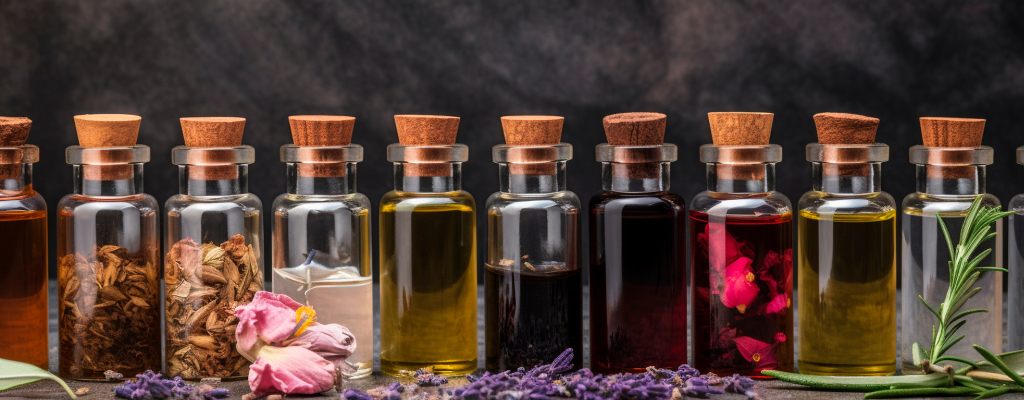Essential Oils in the Kitchen Cooking with Garlic Onion and Herb Oils
The kitchen is a place of sensory delight, and essential oils open up a new dimension in culinary creativity. Imagine elevating your dishes with the concentrated essence of garlic, onion, or fresh herbs like rosemary, thyme, or basil. Cooking with essential oils not only enhances flavor but also offers exciting health benefits, incredible versatility, and an extended shelf life for your culinary staples. This guide will take you through the benefits, safety considerations, and recipes to inspire your experiments with essential oils in the kitchen.
Unlocking Flavor and Creativity with Essential Oils
The allure of cooking with essential oils lies in their ability to pack bold, mouth-watering flavors into a few drops. Whether it’s the savory richness of garlic oil, the sweet tang of onion oil, or the herbaceous potency of rosemary or basil oils, these concentrated ingredients transform ordinary dishes into extraordinary creations. Beyond taste, essential oils offer potential health benefits, such as the antimicrobial properties of garlic or the calming effects of thyme. They’re also remarkably versatile, finding a place in sautéing, roasting, marinating, and even as finishing touches for your plates.
For culinary enthusiasts and home cooks, essential oils offer a playground to craft unique flavor combinations while reducing the need for large quantities of fresh or dried ingredients. But before you start experimenting, understanding safe cooking practices is key.
Safety First Precautions for Cooking with Essential Oils
Cooking with essential oils is thrilling, but it’s important to handle them carefully. Here are some essential tips for safe and enjoyable use in your kitchen:
- Select high-quality food-grade essential oils. Not all oils are created equal; ensure yours are specifically labeled for culinary use.
- Start with small quantities. These oils are potent, so a little goes a long way. Start with one drop and build gradually.
- Avoid high-heat cooking. Prolonged exposure to heat can degrade the essential oils and diminish their flavors or health benefits. Use them in lower-heat cooking or as finishing oils.
- Handle oils with care. Store them in dark-colored glass bottles away from direct sunlight or heat, and ensure proper ventilation when using them.
- Educate yourself on dilution ratios. Proper dilution prevents overpowering flavors and ensures you’re cooking safely.
With these precautions in mind, you’re ready to get started with essential oils in your kitchen. Below, we’ll explore how to incorporate garlic, onion, and herb-infused oils into your favorite recipes.
Garlic Oil Recipes and Cooking Tips
Few ingredients carry the universal appeal of garlic. Garlic essential oil distills its robust flavor into a concentrated form that’s perfect for enhancing dishes. Add just a drop or two to pasta, roasted veggies, or buttery bread for a satisfying depth of flavor.
For example, try Garlic Oil Pasta. Toss freshly cooked pasta with a tablespoon of garlic oil, sprinkle with grated Parmesan, and finish with some fresh parsley. The result? A rich, aromatic main course that’s both simple and impressive.
For appetizers, garlic oil is ideal for brushing onto crusty bread before grilling or drizzling over warm dips. Use it sparingly, as its bold flavor can easily steal the show!
Onion Oil Ideas for Accompaniments
Onion essential oil offers the familiar sweetness and slight tang of cooked onions but without the prep work. A single drop can add depth to soups, stews, and savory spreads.
Picture this pairing for your next gathering – Onion Oil Bruschetta. Toast slices of artisan bread, top with diced tomatoes and fresh basil, and finish with a delicate drizzle of onion oil. It adds just the right kick while allowing the freshness of other ingredients to shine.
Onion oil also makes an excellent addition to creamy sauces or dressings. Whisk it into mayo or yogurt-based dips for an intriguing twist you’ll want to repeat.
Herby Delights with Rosemary Thyme and Basil Oils
Herbal essential oils such as rosemary, thyme, and basil infuse dishes with a burst of natural fragrance and remarkable taste. Each herb brings its own personality to the table, making these oils a must-have in a culinary enthusiast’s pantry.
When cooking with rosemary oil, it’s hard to go past Rosemary Roasted Potatoes. Coat halved baby potatoes with olive oil, add a drop of rosemary oil, sprinkle with salt and pepper, and roast until golden. The subtle but unmistakable rosemary aroma will leave your dinner guests asking for seconds.
For proteins, thyme oil works wonders. Create Thyme-Infused Chicken by combining one drop of thyme oil with olive oil, lemon juice, and a pinch of salt and pepper. Marinate chicken before grilling or baking for a mouthwatering herbaceous bite.
Finally, basil oil elevates pizza and pasta dishes effortlessly. Whip up a Basil Pesto Pizza with a base of basil oil pesto, fresh mozzarella, tomatoes, and just a hint of crushed red chili for heat. This fragrant creation is guaranteed to be a hit.
Storing Essential Oils Keeping Freshness Intact
Proper storage is essential to preserving the quality and potency of your essential oils. Follow these simple tips to keep them in top condition:
- Choose dark-colored glass bottles. Protect your oils from light exposure by storing them in amber or cobalt blue glass.
- Seal tightly. Close bottles tightly after each use to prevent evaporation and oxidation.
- Store in cool, dry places. Avoid heat sources like stoves or ovens and keep oils out of direct sunlight.
- Check for quality. Regularly inspect your oils for any changes in color, odor, or consistency that could indicate spoilage.
- Label and date. Clearly mark bottles with purchase dates to help track shelf life.
Following these steps ensures your oils remain fresh and safe, ready to enhance your dishes whenever inspiration strikes.
Bring Essential Oils to Your Kitchen
Cooking with essential oils is an adventure waiting to happen. The versatility, concentrated flavor, and potential health benefits make them a valuable addition to any kitchen. Whether you’re enriching a simple pasta dish with garlic oil or roasting fragrant rosemary potatoes, essential oils invite creativity and exploration into your culinary routine.
Excited to get started? Experiment with these recipes or discover your own combinations. For more ideas and inspiration, explore our library of essential oil-based recipes and bring new flavors to your table today.




